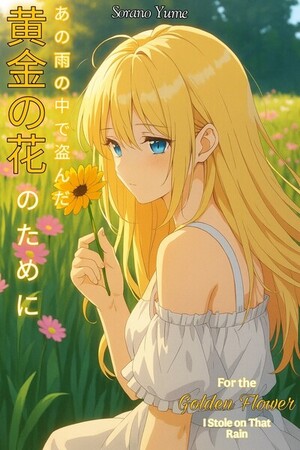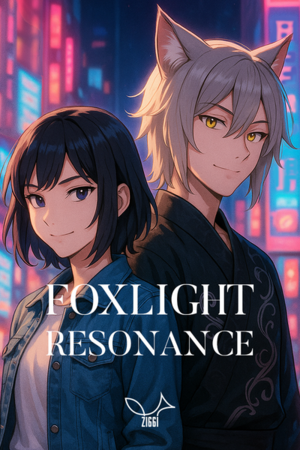Chapter 11:
Chapter 11: In A World Full of Hidden Colors (IV)
For The Golden Flower I Stole In That Rain
"Your son is an art savant."
I was just six years old when I first heard those phrases from a classy-toned old man with a Hungarian mustache in an art museum. I was too young back then to understand what he meant by savant or why he was telling me that at all, so I merely nodded my head and smiled in acknowledgement of the compliment being paid to me.
This wasn't just a random visit. It was another art of my mother being hung on the display cases. It was an oil painting of Hirosaki Castle at Aomori, and for me, as a six year old with an unmatched energy and elation for such a spectacle, it meant everything.
They knew me as the quiet kid at the back of the class, the dango seller that doesn't talk much outside of business, and a ghost that floats past people, but before, I was something else entirely.
A child full of dreams, just like you. A kid that wanted to impress the world, to leave memories, to let my cheeks feel the warmth of summer, and to paint the lights of spring.
A person that wanted to follow his parents' steps.
I was seven years old when my first watercolor landscape hung in a downtown gallery. Nine when I sold my first oil painting for enough money to renovate our kitchen. Ten when critics compared me to Monet and Vermeer.
I was once a miracle.
That’s what they called me.
But to me, I just was my mother’s child. A starry-eyed follower to my own hero.
Shimizu Aino.
Before she became the woman who locked herself in the bathroom with the lights off for hours, before the cigarette butts piled up on the kitchen counter, before the nights she stared out the window until the sky bled purple—she was a dreamer.
She wanted her art to reach the Louvre.
Mama was a name once known in Kobe art circles. Her pieces were always soft and focused on rural sceneries, inspired mostly by Camille Pissarro, one of the pioneers of impressionism.
And when I was born, she hung up her brushes and signed the back of her last canvas with a dot, not a name.
"For you," she said, holding me against her chest.
It was just a small piece of oil painting with a flower vase as a subject, but to me, it was a gift of a lifetime.
She taught me how to hold a brush before I learned to tie my shoes, how to feel the texture of canvas with my palm, how to blend color like breathing, and how to see things beyond the surface, towards what is imperceptible.
My first piece was an abstract, a messy mix of colors as if someone painted something with eyes closed.
I wanted to discard it, but Mama said that forgetting the ugly turns on journeys meant deleting the whole journey at all.
So she provided me with another canvas with a smile.
"Remember, Itsuki," her voice was a melodic whisper, "painting is like breathing. It should flow naturally."
She didn't correct my clumsy attempts or chide my impatience. Instead, she leaned in, her gentle smile reflecting in my wide eyes. "Now, what does the sky need?" she asked, her gaze encouraging.
I hesitated, then pointed to a deeper shade of blue. She nodded, her eyes twinkling. Together, we swirled the colors, creating a sky that was uniquely ours—a bit wobbly, perhaps, but filled with the boundless dreams of a child and the unwavering love of a mother.
The next pieces finally took form.
I began my journey to bring art to life as if I poured myself into the canvas.
It became my identity.
And I never knew that somebody took it as a competition.
I was too young back then to realize that something was already shifting, because all I wanted was to satisfy myself by making my parents proud.
At first, they were. Papa praised me. Mama submitted my works in contests. They clapped louder than anyone in the gallery when I won.
Then came the local newspapers.
The invitations.
The worst yet, comparisons.
"You’re better than her," someone said once, not even trying to whisper.
Mama smiled when she heard it.
But something behind her eyes cracked.
And our little studio in the house darkened—far from the vibrant colors we once shared.
Easels were sidelined, replaced with stacks of books primarily handed out by my father, Shimizu Kentaro, a university professor.
It wasn't about bedtime stories, beasts versus heroes, but imposing tomes on philosophy, history, and topics that never fitted a child's head.
At first, I devoured them with the same curiosity I approached a new tube of paint. The surnames became repetitive and familiar. Monet, Picasso, and Morisot gave way to Nietzsche, Kant, and Dostoevsky.
Everything spoke of consequences, control of imagination, and stealing spotlights like a math equation. It was full of logical deductions, statements from people that only see grey.
I just realized everything years later.
Those books weren't given to cultivate me, but to dilute me and strip my creativity. It made me question everything around me. The worse, it steered me somewhere quieter, more clinical, further from the smell of paint and turpentine.
Still, I painted, even though it felt like an illicit secret.
I painted because it made sense.
Because I can create something out of nothing.
Because colors never lied to me.
Because my hands knew things my mouth didn’t.
When I was ten, my mother got pregnant again.
I remembered how carefully she walked and touched her stomach in quiet moments when no one was looking.
But by then, she had already stopped watching me paint.
She stopped praising me.
She indulged in alcohol and smoking, locked herself without prior reasons, a critical harm on her constantly sensitive situation.
The house reeked like spoiled dreams and bitterness.
Then one day, she found one of my new pieces—hidden behind the washing machine. It was a portrait of her, smiling the way she used to.
But appreciation turned into apprehension.
"We already told you to stop painting, right?! The world we live in isn't based on these frivolous colors! Haven't you realized that reality? Everything is formed from hierarchy and judgement!"
The scent of her alcoholic breath was as sharp as the words she just said.
"But mama..."
It was far from what you used to believe, I wanted to say.
But I wasn't able to.
Because I was silenced when she tore it in half—sobbing like she was mourning a version of herself she hadn’t seen in years.
And the uncomfortable question in my head swirled like a broken player.
Do your dreams disappear when you become an adult?
Does everyone lose hope when they realize that the world is cruel?
And she collapsed. There was blood trailing to her legs.
Papa wasn't home back then, so I had no way of knowing how to respond.
She lost the baby, my brother.
And after a thorough beating and screaming, I lost them.
They blamed me.
They didn't need frank and blunt words to make me realize such a thing. Three books about nonverbal communication was enough to make me understand just by looking at their facial expressions. It was in the way they stopped calling me their own, and in the way they looked at me as if I was defective.
We were already strangers living under the same roof.
“You should’ve stopped,” Papa told me once. “If you really loved her, you would’ve stopped.”
And the final nail in the coffin, their quiet divorce.
I woke up the next day to find the house empty. No note. No keys. No food. Just silence.
I lived off leftovers and whatever money was hidden in drawers. I didn’t tell anyone. I was afraid if I did, someone would come and take away what little I had left.
I sold what I could to pay up the loan sharks, sparing the canvases I filled with meanings before.
I swore never to touch a brush again.
Because art didn’t just fail me.
It took everything from me.
When people ask me why I sell dango, I laugh. But the truth is, it’s the only thing I can make that doesn’t break something in me.
That doesn’t pull ghosts out of the shadows.
That doesn’t make me remember who I was before the paint turned poisonous.
Now, when I see colors, I don’t think about beauty.
I think about grief.
And I think about that small boy, sitting in front of an easel too big for him, trying to make something lovely enough to be loved.
He didn’t know.
He didn’t know that the more beautiful the painting, the more it shattered the people he wanted to keep.
And maybe that’s why he buried it.
Because even now, he still wonders—
If he had been ordinary, would they have stayed?




Please sign in to leave a comment.